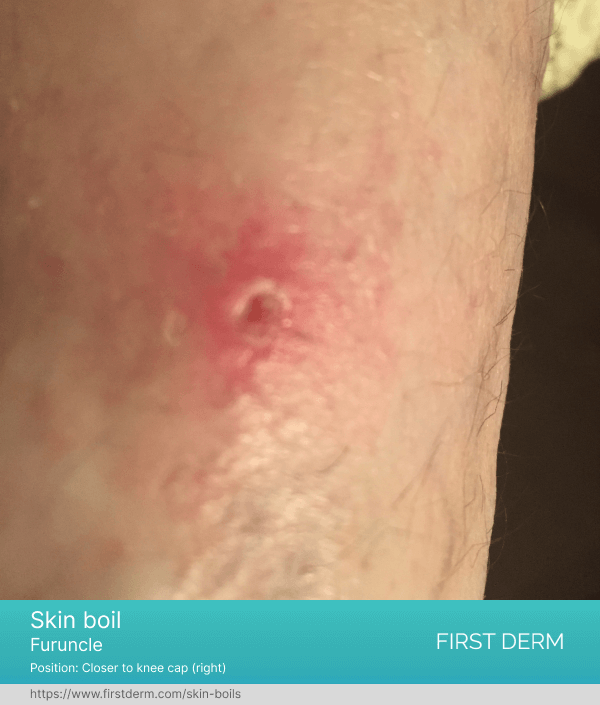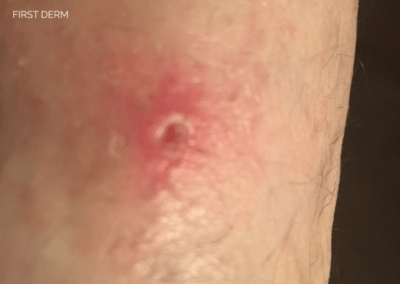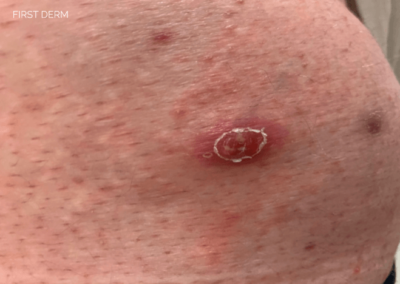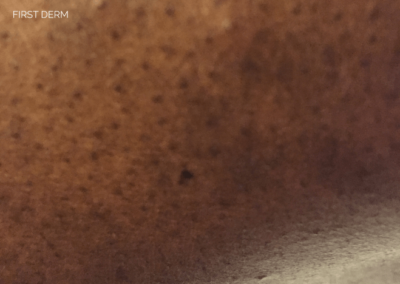Skin Boils
Medically reviewed by The Dermatologists and written by Dr. Alexander Börve
- Very common
- Bacterial infection: Staphylococcus aureus
- Symptoms: Usually present as painful, red, and swollen bumps on the skin that may contain pus or other fluids.
- Location: Commonly found on the face, neck, armpit, buttocks, and thighs.
- Appearance: Small, reddish bump (early stages)
- ICD: L02.0
Skin boils, also known as furuncles, are painful and often unsightly skin infections that can occur anywhere on the body. They are typically caused by a bacterial infection that affects a hair follicle or oil gland.
Carbuncles are a more severe type of boil that can affect multiple hair follicles and are typically larger than a standard boil. In this article, we will explore the causes, symptoms, and treatments for skin boils and carbuncles.
What are Skin Boils and Carbuncles?
Skin boils and carbuncles are skin infections that typically occur when a hair follicle or oil gland becomes infected with bacteria, most commonly Staphylococcus aureus. The infection causes a red, tender lump to form on the skin that may be painful to the touch.
Boils are typically smaller and may be filled with pus, while carbuncles are larger and may have multiple heads or openings.
Symptoms
The symptoms of boils and carbuncles can vary depending on the severity of the infection. Boils typically start as a small, red bump that gradually grows larger and may fill with pus. The surrounding skin may be swollen and painful, and the boil may eventually burst and drain on its own.

Stage of skin boil healing process: picture of boil after pus drainage, revealing redness and swelling in the surrounding skin tissue. Depending on the size and severity of the boil, it may continue to drain small amounts of pus for several days. As the boil heals, it may form a scab or crust over the drained area, which will gradually fall off as the skin underneath continues to heal.
Carbuncles are typically larger than a standard boil and may have multiple heads or openings. Other symptoms may include:
- Fever
- Fatigue
- Swollen lymph nodes
- Redness or inflammation around the affected area
When to See a Doctor
Most boils and carbuncles can be treated at home with warm compresses and over-the-counter medication. However, you should see a doctor if:
- The boil is located on your face or spine
- The boil is larger than 2 inches in diameter
- You have a fever
- The boil is very painful
- You have multiple boils or carbuncles
- You have a weakened immune system
More than 70% of our users get better with Over-the-Counter Medication
Avoid an unnecessary visit to a doctor! Receive expert dermatological advice from the comfort of your own home.
Causes of Skin Boils
Boils and carbuncles are typically caused by a bacterial infection that affects a hair follicle or oil gland. Staphylococcus aureus is the most common type of bacteria that causes skin boils, but other types of bacteria may also be responsible. The infection can occur anywhere on the body, but it is most commonly found on the face, neck, armpits, buttocks, and thighs.
Risk Factors
Certain factors may increase your risk of developing skin boils, including:
- Poor hygiene
- Diabetes
- Obesity
- Weakened immune system
- Exposure to harsh chemicals or irritants
- Close contact with someone who has a skin infection
Prevention
There are several things you can do to reduce your risk of developing skin boils, including:
- Practice good hygiene by washing your hands regularly and keeping your skin clean
- Avoid sharing personal items, such as towels or razors, with others
- Keep any cuts or wounds clean and covered until they are fully healed
- Wear loose-fitting clothing to reduce friction and irritation on your skin
- Avoid exposure to harsh chemicals or irritants
- Outlook for People with Boils and Carbuncles
Most boils and carbuncles can be treated at home with warm compresses and over-the-counter pain relievers. In some cases, your doctor may need to drain the boil or prescribe antibiotics to clear the infection. The outlook for people with boils and carbuncles is generally good, and most infections clear up within a few weeks.
Complications
While most skin boils will eventually heal on their own, in some cases, they can lead to more serious complications, including:
- Abscesses: A skin boil that is not properly drained can cause pus to build up and form an abscess. Abscesses are pockets of pus that can be painful and may require surgical drainage.
- Cellulitis: When a skin boil becomes infected with bacteria, it can spread and cause a condition called cellulitis. Cellulitis is an infection of the skin and underlying tissue that can cause redness, swelling, and warmth.
- Septicemia (blood poisoning): If the bacteria from a skin boil enters the bloodstream, it can lead to septicemia, a potentially life-threatening condition. Septicemia can cause fever, chills, low blood pressure, and organ failure.
Do Boils Recur?
Some people may be more prone to developing skin boils than others, and they may recur in the same area over time. If you have a history of recurrent skin boils, your doctor may recommend additional treatment or testing to identify any underlying health issues that may be contributing to the infections.
Can skin cancer cause boils?
No, skin cancer does not typically cause boils. Skin cancer is a type of cancer that develops in the skin cells and can present as abnormal growths or changes in the appearance of the skin. Boils, on the other hand, are usually caused by bacterial infections of the hair follicles or sweat glands in the skin.
While skin cancer and boils are not directly related, it is important to note that any unusual growths or changes in the skin should be evaluated by a dermatologist or medical professional to rule out the possibility of skin cancer. This is especially true if the growth is irregular in shape, has an unusual color or texture, or is accompanied by other symptoms such as bleeding or itching. Early detection and treatment of skin cancer can significantly improve outcomes, so it is always best to err on the side of caution and seek medical advice for any concerning skin changes.
How can I keep it from spreading to others?
If you have a boil or carbuncle, it is important to take steps to prevent the infection from spreading to others. This includes:
- Covering the affected area with a bandage or dressing
- Washing your hands regularly
- Avoiding close contact with others, especially if you have a weakened immune system
Key takeaway
Skin boils and carbuncles can be a painful and unsightly condition, but they are typically easy to treat with home remedies or medical intervention. Good hygiene and taking steps to prevent the spread of infection can help reduce your risk of developing skin boils or carbuncles.
If you have a boil or carbuncle that is causing you pain or discomfort, or if you have multiple boils or carbuncles, it is important to see a doctor for proper diagnosis and treatment. By following these guidelines and taking proper precautions, you can effectively manage and prevent skin boils and carbuncles.
Disclaimer
The information provided in this article is for educational purposes only and is not intended to replace the advice of a healthcare professional. If you have a skin boil or carbuncle, or any other medical condition, please seek the advice of a licensed healthcare provider.
Source:
- American Academy of Dermatology Association. Boils and Carbuncles. [Internet]. [cited 2023 Feb 24]. Available from: https://www.aad.org/public/diseases/a-z/boils-carbuncles-overview
- MedlinePlus. Boils and carbuncles. [Internet]. [cited 2023 Feb 24]. Available from: https://medlineplus.gov/boilsandcarbuncles.html
- NHS. Boils and carbuncles. [Internet]. [cited 2023 Feb 24]. Available from: https://www.nhs.uk/conditions/boils-and-carbuncles/
- Centers for Disease Control and Prevention. Methicillin-resistant Staphylococcus aureus (MRSA) infections. [Internet]. [cited 2023 Feb 24]. Available from: https://www.cdc.gov/mrsa/index.html

The Specialist doctor from the University Hospital in Gothenburg, alumnus UC Berkeley. My doctoral dissertation is about Digital Health and I have published 5 scientific articles in teledermatology and artificial intelligence and others.




